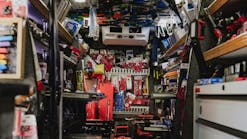Content brought to you by Professional Distributor. To subscribe, click here.
When a technician had a truck torn halfway apart in the bay only to discover that he needed a manifold drill template that he didn’t have to finish the job, he called up Cornwell Quality Tools dealer Dylan Finck. With the tool in stock, Finck had it in the technician’s hand within hours, saving the day and ultimately making a great impression on the customer.
“Now, when there’s something specialty they need, I’m the first guy they call,” Finck says.
This wasn’t the first time he came to a technician’s rescue, and it certainly won’t be his last. Specialty tools make up a significant percentage of tools on Finck’s truck and for a good reason.
“Oftentimes, customers can’t wait for specialty tools, or they risk tying up a bay for a prolonged amount of time,” Finck notes, who is based in northeast North Carolina. “I always try to stock as much of a variety as I can to help them out.”
He also tries to stock specialty tools that other mobile tool dealers don’t have. If by chance he doesn’t stock it, he works quickly to find it.
Just recently, he had a customer call him late in the day looking for cam locking tools for a Ford 3.5L. Finck not only found exactly what he was looking for but was then given a list of other specialty tools that he wanted Finck to find.
For technicians, specialty tools provide an easier, more efficient way to complete complex and time-demanding jobs.
“They can do a 10-hour job in four hours by having the correct tools designed specifically for that job,” Finck says. “For mobile tool dealers, they make you more well-rounded where you can be the ‘go-to guy’ when they have something weird that they need.”
Working together
As vehicle and component designs are becoming harder to access and service with basic tooling, having tools designed to tackle specific tasks and applications are not only helpful for technicians but are becoming essential.
“Just about every vehicle manufactured these days requires specialty tools,” says Alberto Roldan, technical director, CTA Manufacturing Corporation.
Specialty tools are needed to service specific components such as timing systems, break pistons, engine head bolts, transmission fluid service, damaged lug bolts and lug nuts, and much more, he notes.
Whether component specific or vehicle specific, specialty tools are constantly being created, evaluated, and redesigned based on end user’s needs. Development of such tools is largely a result of the relationship and communication between technicians and tool manufacturers, making mobile tool dealers’ key players.
In addition to having a team of technicians who specialize in certain vehicle manufacturers, CTA Manufacturing relies on feedback from mobile tool dealers from trade shows, ride along trips, and other means of communication to help the company stay up to date with the industry and informed on future tooling needs.
Through shared feedback, the company discovered that the dipstick from many V8 engines in pickup trucks and SUVs, especially domestics ones, tend to snap off and trying to extract the broken piece is a hassle for technicians. To help resolve this issue, the company created its 4-pc Master Dipstick Tube Extractor Kit, No. 5414, to extract the broken dipstick tube. The extractor simply threads into the tube, allowing it to be removed easily.
Some tool manufacturers have programs in place that encourage individuals to submit new tool ideas directly.
Lisle Corporation’s Idea Program is one. If the company ends up moving forward with the product idea, the submitter will get paid a royalty.
“We pay over 115 people every quarter for their tool ideas,” says Eddie Lisle, sales manager, Lisle Corporation. “If anyone has a good idea, certainly submit [it]. We’ll review it and if we decide to go forward with it, say even three to four years down the road, we’ll contact the individual.”
The company has been running this program for almost 50 years. To submit an idea, there is a light bulb icon that says ‘Idea Program’ found at the top on their website.
Lisle Corporation’s 45 Degree Disconnect Pliers, No. 37140, was recently added to the company’s line of tools after being selected from the Idea Program. The tool’s low-profile design with 45-degree bend allows technicians to easily disconnect the fuel line, EVAP line, and DEF fittings with tabs that must be depressed to disengage. It's ideal to work on Delphi two tab connectors and some import vehicles. The tool can also be used on some electrical connectors.
Schley Products is another company that has a new tool idea program. If the company determines the idea has potential, they will offer an award or royalty agreement. Individuals can simply fill out an online form found on their website.
A factor that many tool manufacturers take into consideration when introducing new specialty tools to the market is how many vehicles the tool can service.
It can be frustrating for a technician to buy one tool for one job, notes Justin Fisette, senior product marketing manager for tools, equipment, and A/C, at OTC.
OTC’s Ball Joint Connected Adapter Starter Kit, No. CA7149, was designed to not obsolete technician’s existing tools, but to create a new, bigger kit.
The kit includes seven cups and adapters for more than 230 vehicle models. The extra-large C-frame uses stainless steel ball bearings to securely hold the cups and adapters, making it easier to setup the press to remove and install ball joints, U-joints, wheel studs, and more.
“Its main benefit is that the adapters click in or lock into the C-frame, allowing a technician to set it up one handed to keep the other hand free for holding an impact or a wrench, and also prevents those adapters from flying all over the place once a ball joint is either removed or replaced,” Fisette says.
Selling specialty tools
While some specialty tools may be used daily, others may only be used for a specific application on a specific vehicle. This can make it tricky to know which tools you should stock.
While there’s a lot to learn, first things first – study your customers.
“Selling specialty tools requires more ‘targeted selling’,” Finck says. “It requires walking into a shop with a game plan. I pay attention to exactly what different technicians specialize in and target them with different specialty tools to make their job easier and more productive.”
Finck finds it best to keep up on new products released through Cornwell Tools, wholesale distributors, various publications, and tool vendor’s websites.
“I try to learn as much as I can about all the different specialty tools so I can sell them the best that I can,” he says.
Since Finck visits a variety of shops ranging from dealerships and small-town shops to heavy duty to marine shops, he also takes into account the different tools they ask for and buy more of on a regular basis to make sure he always has them on hand.
For example, specialty presses, injector pullers, and cylinder liner pullers are top sellers for his heavy-duty customers. As for his smaller shops, specialty fuel line and coil release tools and special bent nose pliers are common.
However, regardless of shop size or specialty, the most common type of specialty tools he sells are timing tools.
“There seems to be a different [timing tool] out there for every engine,” he notes. “I sell quite a few OTC Ford timing tool master kits. Ford is pretty notorious to needing tons of timing tools to work on their engines.”
Where your route is located can also play a role in knowing what specialty tools to stock. For Finck, his route runs mostly along the coast in northeast North Carolina.
“Rust is a very bad issue by the coast,” he notes. “I sell a ton of Lisle drill template kits for broken bolts [since that] is a very common issue out here.”
Much like any other tool, technicians are going to weigh their options depending upon price, quality, and user friendliness when making a new purchase. In the case of specialty tools, Finck recommends looking at it as more of a tradeoff between price and time saved.
“Technicians usually won’t spend $1,000 to save five minutes of work, but they would spend $1,000 to save them hours of work,” Finck says.
If Finck finds a customer debating between two tools, he’ll push for the tool with better quality and user friendliness. Since they may only use the tool once a week, or once a month, he wants to make sure it’s going to work and do its job well.
Going beyond
Asking customers questions is always a great way to find out what they are looking for. For specialty tools, taking time to ask even more specific questions can be key to making the sale.
CTA Manufacturing’s Roldan recommends mobile tool dealers dive a little deeper, even if they’re not overly familiar with the vehicle or know exactly what the technician is doing. Finding out as much information as possible such as the application, year/make/model of vehicle, engine, etc. all helps narrow down what specialty tool is needed.
It also never hurts to introduce a new specialty tool to a customer on the truck by saying something along the lines of “I heard about a new tool that does this”. It’s not only a good conversation starter but allows for an open-ended question for a technician to respond to, recommends OTC’s Fisette. Perhaps this may spark a service issue or a challenge they recently had, allowing the tool dealer to go into further details of the new tool.
Seeing firsthand the concerns technicians are having in the shop is another great way to go above and beyond.
With years of experience as a technician under his belt, Finck often finds himself going into the bay to look at the vehicle with the technician to figure out what exactly he is trying to accomplish and what tool the technician could use.
“Maybe I can teach him a little bit about what he needs,” Finck says. But in the end, he adds, “it’s just learning the tools and stock what you can”.







